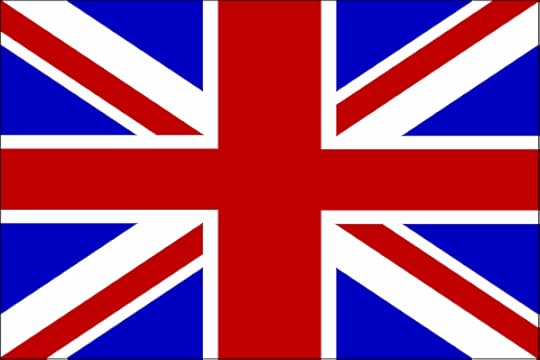Trent Ruble's Blog: The Other Way It Is - Posts Tagged "language"
Separated by a Common Language
My wife, Tami, and I are back in Indiana after a three week visit to the British Isles. We've returned with some lessons learned, some new appreciations, and some plain old observations. First of all, we had a wonderful time and were treated very well by almost everyone we encountered. We like the British and, it seems, they like us.

Both of us had been to Britain in the past so nothing was a total shock, except for my experience in driving. I found that learning to drive on the opposite side of the road, from the opposite side of the car, on super narrow streets, in one of the largest cities in the world, and during the Olympics, can be quite stressful. It didn't help that I'd been up all night prior to renting the car. I eventually became accustomed to driving on the left but was never able to get from one place to another without missing at least one turn.
British Motorways (similar to US Interstate highways) are well marked but, along secondary roads, street signs are difficult to find. Instead of being on a sign post they will usually be found on the corners of buildings...usually, but not always. Streets change names seemingly in the middle of a block, lane markings are worn off, and directional signs are not placed far enough ahead to allow for lane changes, etc... In this area the United States has the advantage with its relative ease of travel.
However, when it comes to public transportation, the UK's thoroughly developed system is far superior to that found in the US. We would see what appeared to be city buses everywhere, even far from the cities, traveling routes on country roads. Here in Fort Wayne, the nearest bus stop is eight miles from my home even though I live just 150 yards outside the city. In London there is also the option of using the subway, or "Underground," as it is known. It is super easy to use with color coded maps placed everywhere and route names like "Jubilee" and "Picadilly" that are easy to remember. Most of the other "tube" passengers were friendly, although the cars were sometimes very overcrowded.
We discovered numerous words and phrases common in Britain that we don't use here, such as whilst (while), biscuit (cookie), sat-nav (GPS) and trainers (sneakers). Of course the opposite is also true; American words such as French Fries (chips), gasoline (petrol) and laundromat (launderette) are not used in Britain. Even so, most everyone understood us and vice versa.
Tami and I won't likely stay in a bed and breakfast again. I thought it would be a good way to really experience British culture and, in that regard, it was a successful endeavor. But, most B&Bs were not clean which ruined the experience. One in Glasgow was so dirty we checked in then checked right back out. I've found the same problem with lodging in other countries, including the United States, so it isn't unique to Britain.
There were a couple of times we had some really good food, such as the expensive chowder I ate in Ireland or the shrimp (or "prawn," as it is known locally) chimichanga I enjoyed in England. But, overall, we are not fond of British food. I especially didn't like the "award winning" faggots I had in Wales, which I found tasted like liver. I never dreamed I would eat such a thing and certainly never will again. The mushy peas were the best part of the meal and I don't like peas.
We were, however, captivated by the very old buildings found throughout Britain, some of which are in ruins. It seemed that each town had at least one old cathedral, abbey or castle. Sometimes these buildings were over a thousand years old and were so grand they would be far too expensive to be built today. Here in America even the old buildings we do have will often be torn down rather than be refurbished. I don't know how it is elsewhere, but in modern America, governments, churches and companies must answer to financial boards that will almost always find it less expensive to tear down old buildings and erect new ones rather than preserve the old.
We found that the British style is generally more sophisticated, but not always. A polished British accent goes well with sharply dressed professionals, but there's an underclass there, as well. In general, though, we liked the respectfulness in the British manner. This could be seen, for example, when the local media interviewed British Olympic athletes. They were always gracious when interviewed and gave credit to their teams instead of themselves. This is refreshing after watching American athletes over the years become more and more prideful. Many times their boastings have ruined what would have otherwise been great performances.
We attended three worship services while in the UK, including one at Westminster Abbey. None were like our home church in Fort Wayne, but all of them seemed to be doing the right thing in their own way. Christianity is on the decline in Europe so it was good to see some solid believers. We pray that they will be a great influence to their people.
Prices were definitely higher in Britain. Tami and I ate at a Hard Rock Cafe' in Edinburgh and paid over $50 for a sandwich, fries and Pepsi for both of us. It cost about $92 to fill our rental car with diesel fuel, which seemed to last forever.
By the end of our trip we learned to appreciate the comfort of our own home and our own culture while admiring the ways of a land from which much of our culture is derived. But, I think I've had my fill of travel... for at least a few months.

Both of us had been to Britain in the past so nothing was a total shock, except for my experience in driving. I found that learning to drive on the opposite side of the road, from the opposite side of the car, on super narrow streets, in one of the largest cities in the world, and during the Olympics, can be quite stressful. It didn't help that I'd been up all night prior to renting the car. I eventually became accustomed to driving on the left but was never able to get from one place to another without missing at least one turn.
British Motorways (similar to US Interstate highways) are well marked but, along secondary roads, street signs are difficult to find. Instead of being on a sign post they will usually be found on the corners of buildings...usually, but not always. Streets change names seemingly in the middle of a block, lane markings are worn off, and directional signs are not placed far enough ahead to allow for lane changes, etc... In this area the United States has the advantage with its relative ease of travel.
However, when it comes to public transportation, the UK's thoroughly developed system is far superior to that found in the US. We would see what appeared to be city buses everywhere, even far from the cities, traveling routes on country roads. Here in Fort Wayne, the nearest bus stop is eight miles from my home even though I live just 150 yards outside the city. In London there is also the option of using the subway, or "Underground," as it is known. It is super easy to use with color coded maps placed everywhere and route names like "Jubilee" and "Picadilly" that are easy to remember. Most of the other "tube" passengers were friendly, although the cars were sometimes very overcrowded.
We discovered numerous words and phrases common in Britain that we don't use here, such as whilst (while), biscuit (cookie), sat-nav (GPS) and trainers (sneakers). Of course the opposite is also true; American words such as French Fries (chips), gasoline (petrol) and laundromat (launderette) are not used in Britain. Even so, most everyone understood us and vice versa.
Tami and I won't likely stay in a bed and breakfast again. I thought it would be a good way to really experience British culture and, in that regard, it was a successful endeavor. But, most B&Bs were not clean which ruined the experience. One in Glasgow was so dirty we checked in then checked right back out. I've found the same problem with lodging in other countries, including the United States, so it isn't unique to Britain.
There were a couple of times we had some really good food, such as the expensive chowder I ate in Ireland or the shrimp (or "prawn," as it is known locally) chimichanga I enjoyed in England. But, overall, we are not fond of British food. I especially didn't like the "award winning" faggots I had in Wales, which I found tasted like liver. I never dreamed I would eat such a thing and certainly never will again. The mushy peas were the best part of the meal and I don't like peas.
We were, however, captivated by the very old buildings found throughout Britain, some of which are in ruins. It seemed that each town had at least one old cathedral, abbey or castle. Sometimes these buildings were over a thousand years old and were so grand they would be far too expensive to be built today. Here in America even the old buildings we do have will often be torn down rather than be refurbished. I don't know how it is elsewhere, but in modern America, governments, churches and companies must answer to financial boards that will almost always find it less expensive to tear down old buildings and erect new ones rather than preserve the old.
We found that the British style is generally more sophisticated, but not always. A polished British accent goes well with sharply dressed professionals, but there's an underclass there, as well. In general, though, we liked the respectfulness in the British manner. This could be seen, for example, when the local media interviewed British Olympic athletes. They were always gracious when interviewed and gave credit to their teams instead of themselves. This is refreshing after watching American athletes over the years become more and more prideful. Many times their boastings have ruined what would have otherwise been great performances.
We attended three worship services while in the UK, including one at Westminster Abbey. None were like our home church in Fort Wayne, but all of them seemed to be doing the right thing in their own way. Christianity is on the decline in Europe so it was good to see some solid believers. We pray that they will be a great influence to their people.
Prices were definitely higher in Britain. Tami and I ate at a Hard Rock Cafe' in Edinburgh and paid over $50 for a sandwich, fries and Pepsi for both of us. It cost about $92 to fill our rental car with diesel fuel, which seemed to last forever.
By the end of our trip we learned to appreciate the comfort of our own home and our own culture while admiring the ways of a land from which much of our culture is derived. But, I think I've had my fill of travel... for at least a few months.
Published on August 12, 2012 13:40
•
Tags:
britain, cultural, cultural-difference, culture, england, great-britain, international, ireland, language, scotland, travel, uk, united-kingdom
The International Language
My wife, Tami, is a first-grade teacher and tells me that it is in first grade when most children learn to read. Even though the kids arriving in her class each August speak English fairly well, it is in learning to read and write that their linguistic shortcomings are exposed. And, she tells me, these shortcomings are the same ones many new immigrants and visitors deal with upon arriving in America.

Our family has observed these shortcomings first-hand as we've hosted six international exchange students from all over the globe. These experiences have been sometimes difficult but overwhelmingly delightful. One of the most enjoyable aspects of hosting is watching the students struggle with the English language. It's not so much that I enjoy seeing them struggle as it is that I enjoy seeing them learn. English is difficult to be sure. Miss Ann Haecker was my high school English teacher at Pagan High where she and I suffered through my sophomore year. If she remembers me at all, she will tell you that I had my share of struggles. In fact, she would be shocked to hear me say that I love the language. But, I do love the language and enjoy helping the exchange students with all its intricacies and nuances.
The exchange students come to America for a variety of reasons, but one of the primary reasons is to improve their English. Our students have always been successful in this and are usually fluent by Thanksgiving. By the time they go home, they speak English well enough to succeed at whatever it is they want to do in life. And, as a bonus, they, and we, will have developed new life long friends.
If you think you would like more culture in your family's life but don't have the time or money to travel, consider international exchange. For more information, contact EF, which is the organization we used, or one of the many other organizations who provide this service. Most of them can be found online. I recommend it.

Our family has observed these shortcomings first-hand as we've hosted six international exchange students from all over the globe. These experiences have been sometimes difficult but overwhelmingly delightful. One of the most enjoyable aspects of hosting is watching the students struggle with the English language. It's not so much that I enjoy seeing them struggle as it is that I enjoy seeing them learn. English is difficult to be sure. Miss Ann Haecker was my high school English teacher at Pagan High where she and I suffered through my sophomore year. If she remembers me at all, she will tell you that I had my share of struggles. In fact, she would be shocked to hear me say that I love the language. But, I do love the language and enjoy helping the exchange students with all its intricacies and nuances.
The exchange students come to America for a variety of reasons, but one of the primary reasons is to improve their English. Our students have always been successful in this and are usually fluent by Thanksgiving. By the time they go home, they speak English well enough to succeed at whatever it is they want to do in life. And, as a bonus, they, and we, will have developed new life long friends.
If you think you would like more culture in your family's life but don't have the time or money to travel, consider international exchange. For more information, contact EF, which is the organization we used, or one of the many other organizations who provide this service. Most of them can be found online. I recommend it.
Published on October 28, 2012 10:55
•
Tags:
english, exchange-student, international, language
The Other Way It Is
The stories and opinions of author Trent Ruble.
Find Trent Ruble on Facebook at: https://www.facebook.com/taruble/ The stories and opinions of author Trent Ruble.
Find Trent Ruble on Facebook at: https://www.facebook.com/taruble/ ...more
Find Trent Ruble on Facebook at: https://www.facebook.com/taruble/ The stories and opinions of author Trent Ruble.
Find Trent Ruble on Facebook at: https://www.facebook.com/taruble/ ...more
- Trent Ruble's profile
- 17 followers



